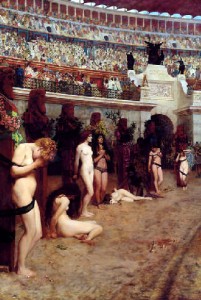 Iain Martin, writing in the Daily Telegraph:
Iain Martin, writing in the Daily Telegraph:
The Church of England’s Archbishops’ Council, headed by Dr Rowan Williams, the Archbishop of Canterbury and Dr John Sentamu, the Archbishop of York, has made a submission on Europe to the Foreign Affairs select committee.
It urges the Government to be more constructive and positive in its attitude to the EU, and warns that David Cameron’s “veto” last December cost the UK credibility. Leaving the EU would be a “travesty”, they claim. Quite a lot of Britons now disagree and think that leaving would be rather a good idea. But the Archbishops explain that they are speaking out because the C of E is “by virtue of its history a European Church”.
Good grief. If the Church of England doesn’t even understand the circumstances of its birth, then how can it expect anyone else to care about what it says?
Quite.
The British politician, Enoch Powell, a British politician who took the role of the Church of England (if not necessarily either its beliefs or its clergy) very seriously, would have been unsurprised by the invincible ignorance of these archbishops.
Here’s what he had to say back in 1972:
The relevant fact about the history of the British Isles and above all of England is its separateness in a political sense from the history of continental Europe…When Henry VIII declared that ‘this realm of England is an empire (imperium) of itself’, he was making not a new claim but a very old one; but he was making it at a very significant point of time. He meant—as Edward I had meant, when he said the same over two hundred years before—that there is an imperium on the continent, but that England is another imperium outside its orbit and is endowed with the plenitude of its own sovereignty. The moment at which Henry VIII repeated this assertion was that of what is misleadingly called ‘the reformation’—misleadingly, because it was, and is, essentially a political and not a religious event.
That’s true, if one considers that Powell was writing in an English context: Henry went to his deathbed considering himself a good Catholic. His dispute with Rome was not over theology, but power. Henry wanted more of the latter (and Anne Boleyn too) but the underlying (and ultimately more important) question was whether England should be governed by English laws or those of some alien authority. Henry VIII, quite correctly, if for self-interested reasons, said that the law begins at home.
Back to Powell…
The whole subsequent history of Britain and the political character of the British people have taken their colour and trace their unique quality from that moment and that assertion. It was the final decision that no authority, no law, no court outside the realm would be recognized within the realm. When Cardinal Wolsey fell, the last attempt had failed to bring or keep the English nation within the ambit of any external jurisdiction or political power: since then no law has been for England outside England, and no taxation has been levied in England by or for an authority outside England—or not at least until the proposition that Britain should accede to the Common Market [the future EU].
That was not something that Thomas Becket (not so surprisingly a traitor in the view of both Henry VIII and Charles I—the last Anglican saint) would have understood or appreciated, so good riddance to him. But Becket was at least Archbishop of Canterbury nearly four centuries before Henry VIII declared England’s independence.He has an excuse, of sorts. The current Archbishop, Rowan Williams, does not. The explanation for what he has said about Europe rests, as it has done so often throughout his disreputable and unpleasant career, in his willingness to put ill-thought, but fiercely-believed, dogma (usually of a leftish variety) before honesty. His upcoming resignation cannot come soon enough.
 Rev. Gavin Dunbar is rector of Saint John’s, Savannah, Georgia, and here’s what he has been saying recently:
Rev. Gavin Dunbar is rector of Saint John’s, Savannah, Georgia, and here’s what he has been saying recently:







